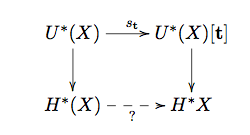Let $U^* \rightarrow H^* $ be the homomorphism describing the complex orientation of $H^* $ from complex cobordism. Let $t_1, t_2, ...$ be indeterminates.
My question is: Does there exist an integral cohomology operation $H^* (X) \rightarrow H^*(X)[\mathbf{t}]$ that makes the following diagram commute for any $X$? If so can we describe it in a way that doesn't involve complex cobordism?

Here $s_{\mathbf{t}}$ is the total Landweber-Novikov operation.
In particular, since the Landweber-Novikov operation satisfies the Riemann-Roch type formula for proper, complex-oriented maps $$ s_{\mathbf{t}} f_{*}x = f_{*}(c_{\mathbf{t}}(\nu_{f}) \cdot s_{\mathbf{t}}x)$$ (where $\nu_{f}$ is the virtual class $1-\nu_i$ and $\nu_i$ is the stable normal bundle of the proper, complex-oriented map $f: Z \rightarrow X$) we would expect ths operations to satisfy something similar.
EDIT: Whoops, original title didn't have to do with the question :) But it did have to do with the motivation behind asking it! Maybe another time...
